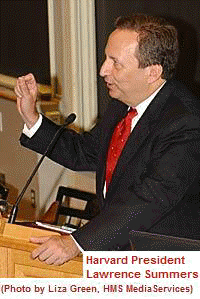Opinion
February 1, 2005
Harvard's
President Makes Headlines for the Wrong Reasons -- Can his Grand
Vision Survive?
 In
1987 as a 33 year old, Lawrence Summers was named Harvard's Nathaniel Ropes
Professor of Political Economy. He also served as US Secretary of the Treasury
replacing Robert Rubin in July 1999, and on the first of July 2001 he replaced
the retiring Neil Rudenstine as Harvard's president.
In
1987 as a 33 year old, Lawrence Summers was named Harvard's Nathaniel Ropes
Professor of Political Economy. He also served as US Secretary of the Treasury
replacing Robert Rubin in July 1999, and on the first of July 2001 he replaced
the retiring Neil Rudenstine as Harvard's president.
Brilliant,
driving, argumentative, abrasive and arrogant, Summers sometimes seems to be his own worst
enemy and there is more than one Harvard faculty member waiting and wishing for
Summers to selfdestruct.
On July 14 Summers spoke to an
off-the-record meeting of the National Bureau of Economic Research at Cambridge,
Massachusetts and according to Nature, while there is no transcript of
what he said, "by most
accounts, he talked about potential reasons why so few women reach top positions
in science and engineering. And he at least raised the possibility that innate
differences could play a part."
Science was somewhat more
specific, "Summers argued that women typically do not work the 80-hour
weeks common to professions like law, business, or science. And while noting
that socialization and bias may slow the progress of women, he cited the gender
variation in test scores as a possible explanation for the larger number of men
at the top of the professional ladder." In any case whatever Summers did say so
infuriated MIT's professor of biology, Nancy Hopkins, she conspicuously walked
out. Hopkins led a highly publicised 1999 effort to expose unconscious bias at
MIT.
The mass media quickly got hold of
the event with the New York Times reporting:
January 18 - Harvard Chief
Defends His Talk on Women
January 21 - President of
Harvard Tells Women's Panel He's Sorry
January 26 - At Harvard, the Bigger
Concern of the Faculty Is the President's Management Style
Nature's January 27 editorial
saw some dark humour in the episode"
Whatever his actual words, the interpretation — that women suffer an
inborn and insurmountable intellectual handicap in science — whipped up a
firestorm of protest both on and off Harvard's (male-dominated) campus.
Swamped by fuming letters and stinging media reports, Summers has released
serial cringing apologies in which he emphasized his efforts to bump up the
number of female scholars at Harvard — actions for which some staff, at least,
give him credit.
Professor Hopkins has been quoted in
the media following the Harvard President's address -- which he is said to have
prefaced with, "I'm here to provoke you" -- as saying, "I felt I was going to be
sick... my heart was pounding and my breath was shallow... I was extremely
upset."
Ruth Marcus, a member of the
Washington Post's editorial staff wasn't overly impressed by Professor
Hopkins and wrote on January 22, "Was there a feminist around -- myself included
-- who didn't wince at this bring-out-the-smelling-salts statement?" And went on
to say in Summers' defence, "Summers (even in his earlier, unexpurgated form)
wasn't saying that no individual woman could be a stellar scientist, or
mathematician, or engineer, only that overall one gender might be more inclined
in that direction than the other... The Summers storm might have been easy to
forecast. But it says less, in the end, about the Harvard president than it does
about the unwillingness of the modern academy to tolerate the kind of
freewheeling inquiry that academics and intellectuals above all ought to prize
rather than revile."
Virginia Valian, professor of
psychology and linguistics at Hunter College and the CUNY Graduate Center in New
York and author of "Why So Slow? The Advancement of Women", responds in the
January 30 issue of the Washington Post to the points that Professor
Summers is reported to have raised in his NBER address and sites studies in
rebuttal to the suggestion that there is an innate sexual difference regarding
ability in maths and science as a factor in unequal representation in university
faculties.
But as the NYT headline of January 26,
At Harvard, the Bigger Concern of the Faculty Is the President's Management
Style, indicates Summers has a very
serious administrative problem which he has now unwittingly allowed to reach
dangerous proportions. In fact a week earlier Nature published a three
page news feature by Helen Pearson -- obviously written before Summers' NBER
remarks and subsequent mea culpas -- titled "The premier division".
It opens with the
header, "Since he took over as Harvard President in 2001, Larry Summers' style
and vision have divided the university. As his plans for expansion step up a
gear, Summers tells Helen Person why it is time for Cambridge to face up to the
need for change." Cambridge referring to the Boston suburb occupied by Harvard.
Shortly after Summers assumed the
presidency he put forward his overall vision for Harvard to remain top of the
academic heap and in no uncertain terms indicated that for the university to
tread water was not going to be satisfactory -- it needed a drastic overhaul. In
practice this means Summers intends for Harvard "to spend billions of dollars
turning" the rather rundown suburb of Allston across the Charles River from
Cambridge into a campus bigger than its Cambridge parent. Currently the Allston
site houses the Harvard Business School. Together with the expansion of
infrastructure Summers wants a far greater resourcing of the sciences to the
point where it assumes pre-eminence, a revamping of its undergraduate program
and a greater degree of central governance thereby reducing the traditional
powers of Harvard's nine relatively autonomous faculties.
Sara Rimer in her January 26 article
in the New York Times writes:
A dozen Harvard professors, as
well as other educators associated with the university, said in interviews
that for all his intellectual vigor and vision, Mr. Summers, a former Harvard
economics professor, has created a reservoir of ill will with what they say is
a pattern of humiliating faculty members in meetings, shutting down debate and
dominating discussions. This ill will, they say, has helped fuel the fury on
campus over what Mr. Summers initially said were meant to be provocative,
off-the-record remarks at an academic conference here on Jan. 14.
Rimer's article prompted an immediate
reply from Steven Shavell, Professor of Law and Economics, Harvard Law School.
To the Editor:
Re "At Harvard, the Bigger
Concern of the Faculty Is the President's Management Style" (Education page,
Jan. 26):
There are
many faculty members at Harvard who are not "concerned" about the management
style of Lawrence H. Summers, the university's president, but who rather
strongly support his leadership of our university, and for two basic reasons.
First, his
substantive decisions strike us as good (notably, his expansion of the campus
and his plans to invest significantly in the sciences).
Second, Mr.
Summers' statements about issues of concern at the university seem to us
intelligent and honest.
But we do have a criticism of
Mr. Summers: that he apologizes for perceived political incorrectness. At
universities, of all places, the ability to speak freely needs to be
preserved.
 Melissa Franklin is an experimental
particle physicist who has been working on the
Collider Detector at
Fermilab, an experiment designed generally to study the collisions of
protons and anti-protons at the highest energies currently possible. With
her graduate students and postdoctoral staff, she is presently building a
large cylindrical drift chamber to measure the momentum of the outcoming
particles. She is also upgrading one of the central muon detectors.
|
The criticisms of Summers reduce to
two, those of style and those of substance. The former seem as much as anything
to stem from what Summers and his supporters see as his predilection for
vigorous cut and thrust argumentation and discussion but his critics see as
overbearing intimidation. Particle physicist Professor Melissa Franklin who had
been prepared to have and did have her say at a Summers' meeting told Rimer she
felt encouraged afterward when Summers telephoned her to say "he wanted to
explore her concerns." In short he seemed to have taken in what she had to say
and thought about it, despite arguing her down.
On the other hand he can make public
statements which are just plain stupid to say publicly whether or not they have
some merit. He is quoted in an October article in The Guardian, "You
know, sometimes fear does the work of reason."
But the substance of Summers vision
is quite a different matter. His urbane predecessor, Neil Rudenstine played the
part of an almost archetypical Harvard president, a fund raiser who exercised
careful diplomacy with the faculty deans. With Summers it's much more, "This is
the way it's gonna be".
So far he seems to have the Harvard
Board on his side, but it could change if Summers is begun to be seen as a
liability for Harvard's image and there are enough Harvard faculty who wouldn't
mind that.
But also Summers is not only wanting
to change the very fabric of Harvard's academic precepts, he is also signalling
the allocation of billions of dollars in order to realize what he sees as
his vision of his university. And those dollars are Harvard's dollars.
That there is some angst at the station is understandable.
From an Australian viewpoint the
drama that is being played out by Larry Summers and Harvard ought to give pause.
Not one of Summers' critics questions his desire to make Harvard a greater
institution than it already is, only his methods. Would the same were true for
those who control the resources and destiny of Australia's universities.
Alex Reisner
The Funneled Web

 In
1987 as a 33 year old, Lawrence Summers was named Harvard's Nathaniel Ropes
Professor of Political Economy. He also served as US Secretary of the Treasury
replacing Robert Rubin in July 1999, and on the first of July 2001 he replaced
the retiring Neil Rudenstine as Harvard's president.
In
1987 as a 33 year old, Lawrence Summers was named Harvard's Nathaniel Ropes
Professor of Political Economy. He also served as US Secretary of the Treasury
replacing Robert Rubin in July 1999, and on the first of July 2001 he replaced
the retiring Neil Rudenstine as Harvard's president.